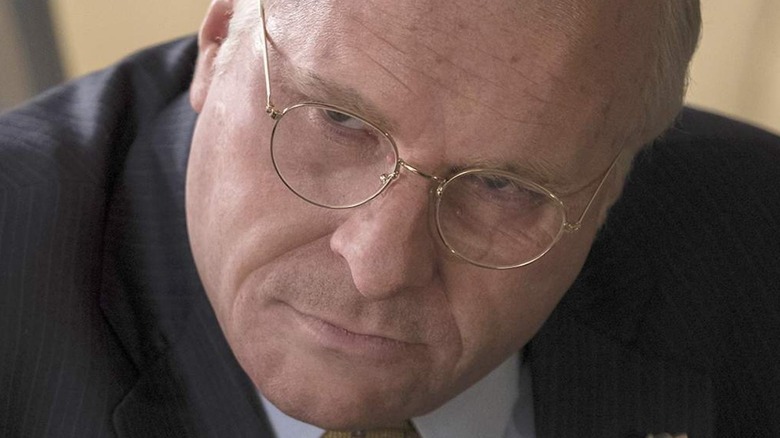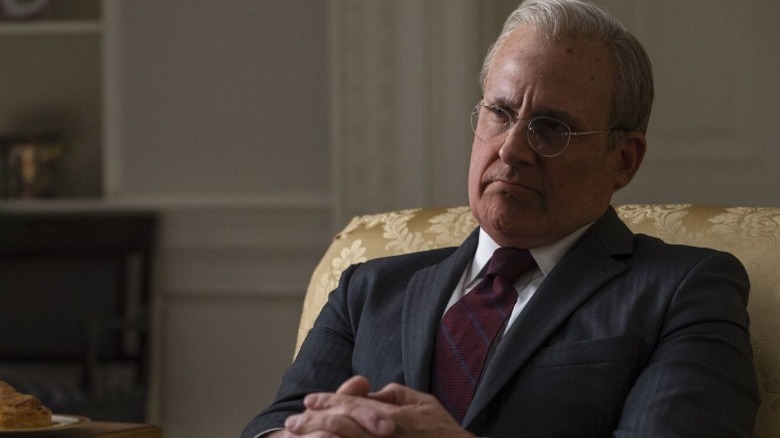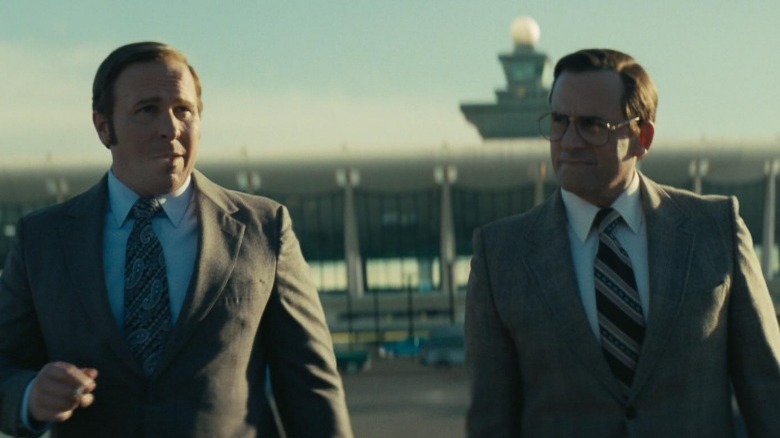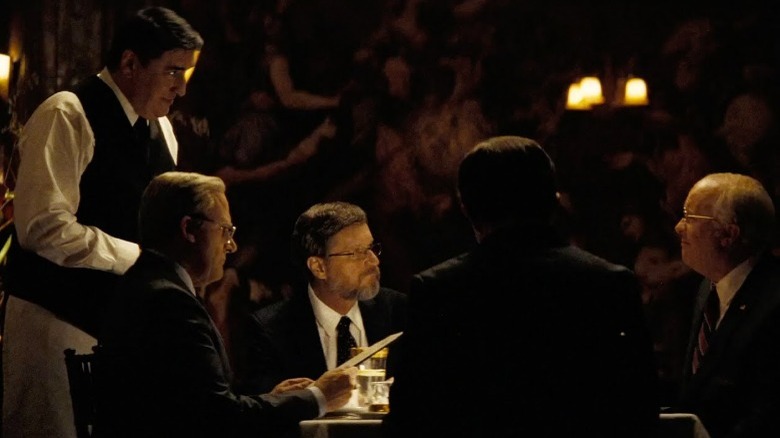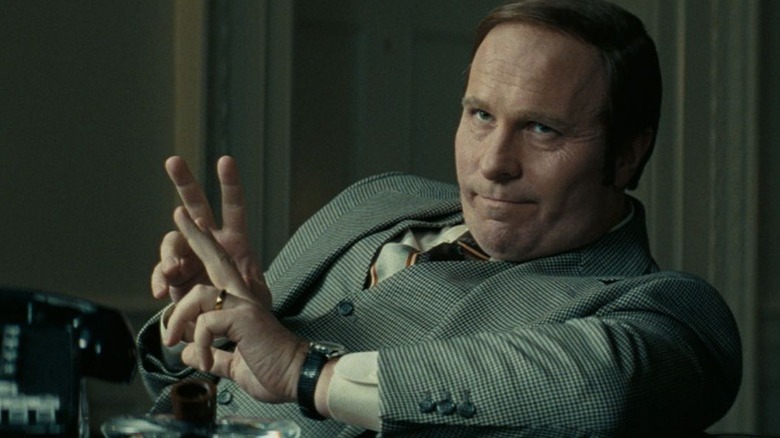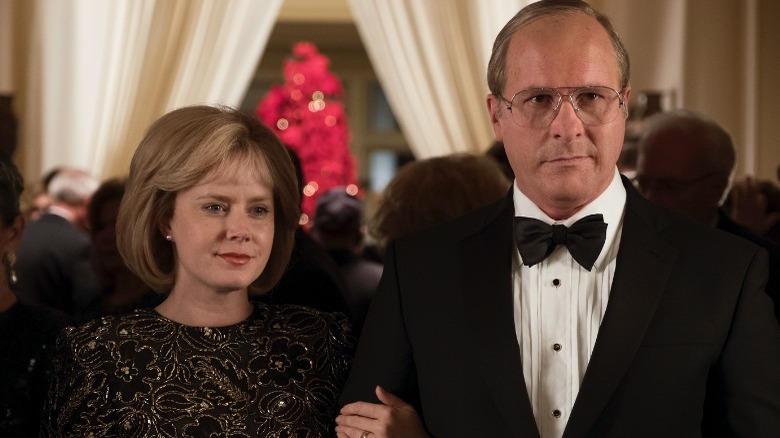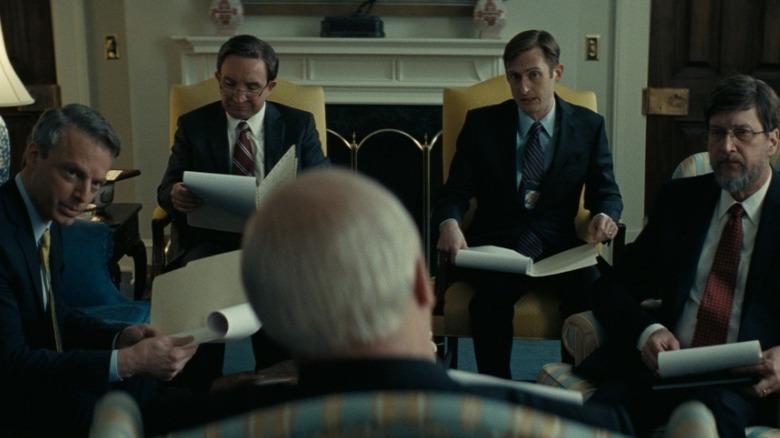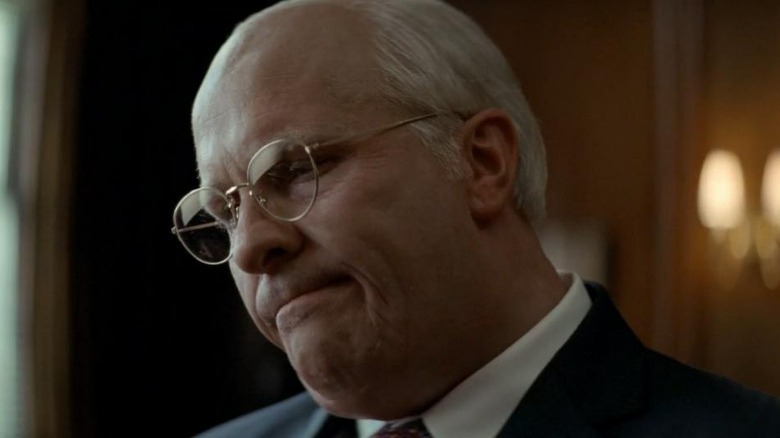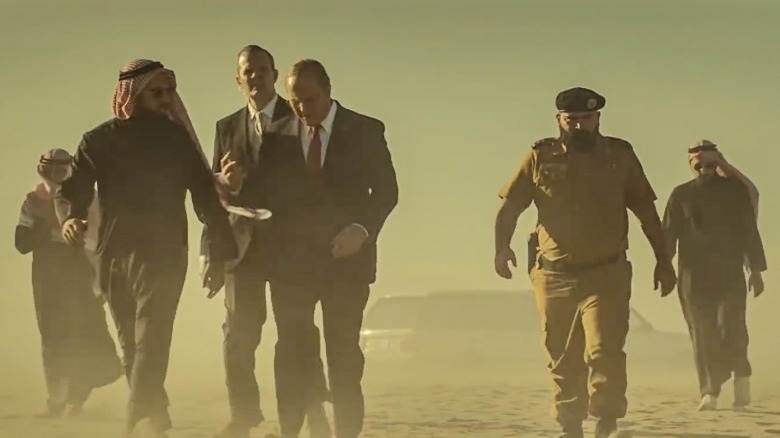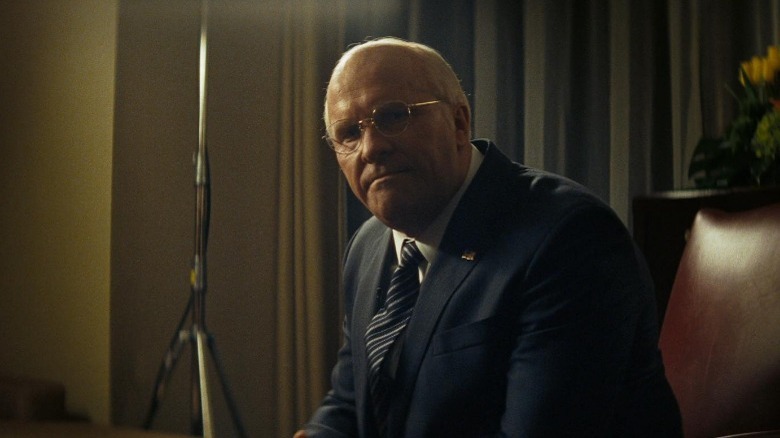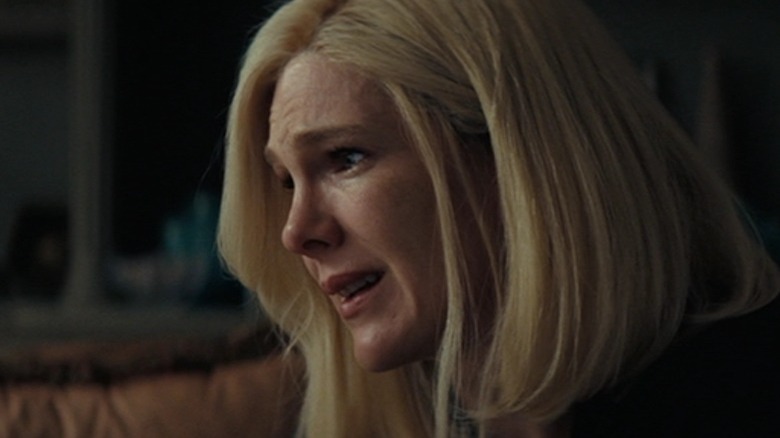Everything Vice Doesn't Tell You About The True Story
Obviously, there are a lot of moments in "Vice" that never actually happened. It's safe to say that Dick Cheney (portrayed by Christian Bale) and his wife Lynne (Amy Adams) did not recite William Shakespeare's "Macbeth" in bed, nor did he attend a fancy restaurant with items such as Guantanamo Bay and the War Powers Act on the menu. (If such a restaurant really existed, we doubt it would pass inspection.) It's no wonder, then, that sifting the facts from fiction in "Vice" is a little bit tricky since some scenes from the movie don't even profess to be true.
Since creating "The Big Short," director Adam McKay has moved away from comedies and has focused on creating more serious works like "Vice" (and, subsequently, "Succession" and "Don't Look Up"). With that being said, there are definitely elements of humor in "Vice." It's still a satire, so it has every right to extrapolate or even exaggerate. But the problem, as outlets like Vox have pointed out, is that most people mistake the movie for an objective and (mostly) realistic history of Dick Cheney. Viewers not familiar with Cheney's history are likely to take everything at face value and assume that everything in the movie actually happened (except for the fantasy sequences that obviously didn't). The true story of Dick Cheney is a bit more complicated, though. While many of the moments in "Vice" did happen, they weren't always exactly like the movie portrays them. So let's explore what "Vice" omits or gets wrong about this titular vice president.
Donald Rumsfeld wasn't the sole reason Dick Cheney chose to be Republican
According to "Vice," Dick Cheney had no party affiliation or political convictions until he met Donald Rumsfeld (Steve Carell). By the movie's account, Cheney was so taken by Rumsfeld's charisma that he decided on the spot that he wanted to be Republican. However, this assumption about Cheney is quite easy to debunk. Cheney was a staunch conservative even before he met Rumsfeld. While he was attending Yale (and yes, flunked out of the prestigious school — the movie got that detail right), Cheney greatly admired his professor H. Bradford Westerfield. Esquire observed that Westerfield was deeply conservative and an ardent Domino Theory advocate, which no doubt shaped young Cheney's attitude toward aggressive foreign policy.
Later, Cheney and his wife Lynne attended graduate school at the University of Wisconsin, where there were frequent student protests. Lynne Cheney recalled in an interview with The New Yorker that she and her husband were put off by the loud and sometimes flashy demonstrations on campus, and she was upset that the protests disrupted classes. "The shocking thing was that you would [walk past the protest and] enter the classroom and here would be all these nice young people who honestly wanted to learn to write an essay," she said. According to her, it was these experiences that cemented her and Dick's conservative values. So by the time Dick Cheney met Rumsfeld, he already knew exactly which party he wanted to join.
The real Dick Cheney was motivated by ideology, not just power
There's one thing most critics agree that the movie got wrong about Dick Cheney: it overlooks his political beliefs. "Vice" paints Cheney as wanting power for its own sake, as implied by a scene in which Cheney asks Rumsfeld, "What do we believe?" and Rumsfeld bursts into cynical laughter.
However, the real Cheney had strong political convictions behind his actions. As Esquire pointed out, Cheney's voting record shows a clear ideological pattern, and he definitely wasn't voting purely based on political expediency. From his opposition to the Equal Rights Amendment to his blocking of gun control measures, Cheney has consistently voted conservatively. In many cases, he has gone out of his way to take positions that were even further to the right than his fellow Republicans, according to CNN. And in a small handful of cases (most notably, the matter of legalizing gay marriage), he has also leaned further left than the other members of his party. If Cheney had only been driven by a need to get ahead in Washington, he would have probably stayed with the pack.
One of Cheney's strongest convictions was that America needed to exert its influence overseas to ensure no other country could threaten its dominance, according to The Washington Post. So, while it is true that Cheney was preoccupied with power, but he was probably more concerned with America's power over foreign countries than his own power in government. Several critics of the film, including Esquire, argued that the movie misses an opportunity to criticize Cheney's imperialistic beliefs because it wanted viewers to think that Cheney didn't believe in anything.
Vice's definition of unitary executive theory is not quite accurate
While it's true that Dick Cheney did use unitary executive theory to seize power, the movie's definition of unitary executive theory is a bit off the mark. In the restaurant scene from "Vice," for example, the waiter (Adrian Molina) describes the theory as such: "If the president does anything it makes it legal. In other words, you can do whatever the f*** you want." Actually, it's more complicated than that.
Instead, advocates of the unitary executive theory say that the president has total control of the executive branch, and in certain cases, he cannot be checked by any other branch of government, according to ThoughtCo. In the most extreme interpretation of this theory, the president is above almost all laws and is only beholden to the Constitution. As a result, per ThoughtCo, Congress has no power over the president unless they resort to impeachment or Constitutional amendment. Members of the Bush administration have used this argument to justify expanded presidential power after 9/11, according to the American Constitution Society.
Even if he got the details wrong, Adam McKay was definitely right to call attention to this dangerous legal theory that threatens checks and balances in the U.S. government. The unitary executive theory is a bipartisan concern. As the film's written outro reminds audiences, although the memos advocating for unitary executive theory were penned during the Bush administration, they are "still in the Department of Justice's records which means [they] can still be cited at any time" by whoever is currently president (per The Justice Journal at George Washington University).
The scene with Antonin Scalia and Dick Cheney is out of character
"Vice" attributes Dick Cheney's fascination with unitary executive theory to a single meeting with Antonin Scalia (Sam Massaro) that took place the 1970s, in which Scalia pitched the theory to Cheney, and Cheney loved it. It is true that Cheney and Scalia were both advocates of unitary executive theory, but the scene didn't happen exactly like in the movie.
For one, the phrase "unitary executive theory" hadn't even been coined in the 1970s, as pointed out by Politifact. More importantly, Adam McKay's portrayal of Scalia is out-of-character. In "Vice," Scalia says that unitary executive theory is "an interpretation a few, like myself, happen to believe, of Article II of the Constitution that vests the president with absolute executive authority." While Scalia may have said something along those lines, he definitely would not have used that wording. Why? Because according to History vs. Hollywood, Scalia was known for his strict and literal reading of the Constitution, believing there's only one way to read it. He wouldn't describe the unitary executive theory as an "interpretation" because Scalia believed the Constitution had no room for interpretation. As far as the real-life Scalia was concerned, the unitary executive theory was written into the Constitution, regardless of what other legal scholars said, as noted by Vox. (No matter that even the founding fathers themselves had conflicting views over how much power the executive branch ought to have.) Scalia was indeed interpreting the Constitution, the same as any other legal scholar, but he certainly wouldn't have described it that way, so the movie is technically putting words in his mouth.
There is no reason to believe that Lynne Cheney's mother was murdered
Most of the creative liberties taken in "Vice" are used to emphasize Dick Cheney's pragmatic ambition and portray him as power-hungry. Yet, one key moment breaks from history to make Cheney seem more sympathetic, even if it is unsupported by evidence.
In 1973, the body of Lynne Cheney's mother Edna was found floating in a Wyoming pond. Although "Vice" never explicitly says this, it strongly implies that Lynne's father had killed her by drowning her. However, there is no hard evidence to support this theory. Possibly, McKay got the idea from a line in Lynne Cheney's memoir, "Blue Skies, No Fences: A Memoir of Childhood and Family," in which she wrote, "[My mother], who had worried since childhood about water, had drowned in the pond ... for years I wondered if she had somehow been the victim of foul play." The memoir also mentions that Lynne's father could sometimes be short-tempered. However, in the same passage, Lynne Cheney shared that she had eventually accepted that her mother's death had been an accident, guessing that it had probably been caused by "the medicine she was taking for her blood pressure, which she had complained made her dizzy." She added that her father had been deeply upset by his wife's death.
When Inside Edition interviewed local authorities about Edna's death, coroner Connie Jacobson said there was no indication that Edna was murdered. The official coroner's report showed that the body had been found with high blood alcohol and concluded Edna's death had been an accident.
Dick Cheney wasn't single-handedly responsible for the George W. Bush-era corruption
While Dick Cheney may have enhanced and arguably even abused his power as vice president, he certainly wasn't the only one to blame. For instance, The Washington Post pointed out that it was George W. Bush (who is portrayed by Sam Rockwell in the film), not Cheney, who was the one who to ask Colin Powell (Tyler Perry) to advocate for the invasion of Iraq at the United Nations. The movie also overlooks the importance of Cheney's aide David Addington (Don McManus). Charlie Savage, author of "Takeover: The Return of the Imperial Presidency and the Subversion of Democracy," told History News Network that Addington handled much of the daily tasks of enacting Cheney's agenda. This included drafting signing statements for Bush that excused the president from enforcing certain clauses of laws that the president had signed himself on the grounds that they restricted his presidential power.
Deputy assistant Attorney General John Yoo (Paul Yoo in the film) was also a force to be reckoned with, advocating for some of the Bush administration's most egregious power abuses. Notably, Woo wrote a memo insisting that America was not responsible for upholding the Geneva Conventions in its treatment of certain suspected terrorists. He penned another document saying that waterboarding did not count as torture because it only created "the misperception of suffocation."
All of these would be considered questionable decisions, but Cheney wasn't responsible for all of them. The bottom line, according to Vox, is that "there were a whole lot of really powerful, manipulative, driven people who made atrocious decisions during the Bush administration." Cheney was just one of many.
Dick Cheney can't really be blamed for post-Bush problems, either
The heart transplant montage from "Vice" shows photos and clips of real-life events that stemmed from Dick Cheney's decisions (like the Iraq War), alongside seemingly unrelated issues that happened long after Cheney's vice presidency (like children being detained at America's southern border). Writer-director Adam McKay appears to be insinuating a direct connection between Cheney's policies and those moments in recent history, but it's a bit far-fetched to blame Cheney for certain post-Bush problems. For instance, it's a stretch to say that Cheney was responsible for the Trump administration's "zero tolerance" immigration policy that resulted in migrant children being separated from their parents at the border. Cheney has actually criticized Trump's attitude toward Mexican immigrants and was even quoted to state, "I disagree with [Trump] on how he describes our Mexican neighbors" (via The Hill).
"Vice" doesn't mention this, but the Obama administration was also responsible for many similarly questionable foreign policy decisions. Even though Barack Obama made closing Guantanamo Bay a campaign promise, he never actually closed it, as PBS pointed out. It's also worth noting that the Obama administration never prosecuted the "enhanced interrogation techniques" used during the Bush era — even though the convention against torture requires the U.S. to investigate any suspected acts of torture, according to Human Rights Watch. Even the director admitted that "Vice" is missing an important part of the story — the culpability of certain Democrats in some of the most controversial Bush-era policies. "I regret not giving more blame to the Democrats, who went along with the war in Iraq," McKay told The Sunday Times (via Variety). "I made mistakes, [so I] read the reviews and went, 'Yes, fair.'"
The movie completely omits Dick Cheney's role in the Gulf War
Many of Adam McKay's ideas for "Vice" ended up on the cutting-room floor (including a musical number). Not everything could make the final cut. But it's strange that the film never mentions Dick Cheney's participation in the Gulf War. The movie suggests that Cheney was not a popular candidate for vice president in 1992 and that nobody paid him any attention until George W. Bush chose him as his running mate in 2000. In reality, Cheney got plenty of public praise as George H.W. Bush's secretary of defense, even appearing in a post-war parade, according to The Washington Post.
It's unclear why "Vice" never covers this stage of Cheney's career. His run as secretary of defense certainly seems like a crucial part of the story — because it would either expose more of Cheney's misdeeds or else humanize him a little, depending on who you ask. Journalist Charlie Savage pointed out that Cheney was pushing the limit of the executive branch's power even back in the 1990s. "He urged [Bush] to launch the Gulf War without going to Congress for permission," Savage told History News Network. (Bush ultimately declined.) Surprisingly, McKay didn't include this startling detail. Meanwhile, Slate argued that Cheney's professional handling of the Gulf War was widely admired, at least compared to his aggressive approach to foreign policy after 9/11. Rather than exploring what might have driven Cheney to suddenly take a more extreme stance, the movie skips over the Gulf War entirely, which reeks of missed opportunity.
Dick Cheney's reasons for supporting the Iraq War were more complicated
"Vice" implies that Dick Cheney's previous affiliation with the oil company Halliburton and his desire to get his hands on Iraqi oil fields was the only reason he advocated for the Iraq War. In actuality, it wasn't necessarily greed motivating Cheney — though his real motives were hardly altruistic. "[Halliburton] no doubt affected Cheney's thinking to some degree," wrote Slate, "but it leaves unexplained the community of neoconservatives — most of whom had no such financial interests — who'd been pushing for violent regime change in Iraq throughout the 1990s."
Cheney had political convictions that drove him to support the Iraq War, and he had these convictions long before he worked for Halliburton. As early as 1990, wrote Esquire, Cheney believed it was important for America to take preemptive action to ensure its supremacy as a global superpower after the fall of the Soviet Union. So Cheney and his Republican colleagues contributed to various drafts of the 1992 Defense Planning Guidance, which was intended to quietly build up American military influence so that it would be impossible for any other nation to challenge its global dominance, according to The Washington Post. Iraq was one such threat in Cheney's eyes, so he would've wanted to seize control of Iraq whether or not he had any stake in the oil fields.
Still, the movie is right about one thing; Cheney was an opportunist. According to The New Yorker, he took advantage of 9/11 to advance his agenda and begin making his vision for America's global influence a reality.
Dick Cheney may not have urged his daughter to campaign against gay marriage
The ending sequence of "Vice" shows Dick Cheney's daughter Liz (Lily Rabe), who previously supported her lesbian sister Mary (Alison Pill), campaigning against gay marriage in order to get ahead in a senate race. This is undoubtedly true. However, the film also posits that Liz only did this because her father gave her permission. If that were true, then "Vice" was certainly right that Cheney had failed as a father. But there's no evidence this is true.
Although there's no way of knowing what happened in the Cheney household, Dick Cheney might not have been the reason why Liz Cheney suddenly changed her position. After all, he'd already publicly voiced his support of his lesbian daughter at a time when most Republicans wouldn't. In a 2009 interview with the National Press Club (via The Huffington Post), for instance, Cheney said of gay couples, "I think people ought to be free to enter into any kind of union they wish" — though he wouldn't support a federal law protecting it. However, it's worth noting that his position was at least relatively daring, since many of his Republican colleagues (including Bush) opposed marriage equality, according to NBC Bay Area. Since Cheney previously defended Mary in public, knowing he would be criticized by his party, it seems unlikely he would privately urge his daughter to take the opposite stance. Although Cheney did defend Liz's views later in her Senate campaign (per Politico), he has otherwise maintained a relatively moderate position on gay marriage (as indicated by a 2015 interview with PinkNews).
